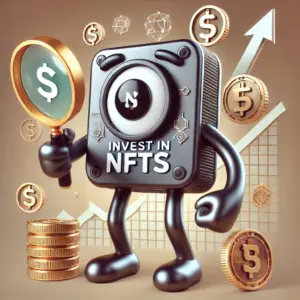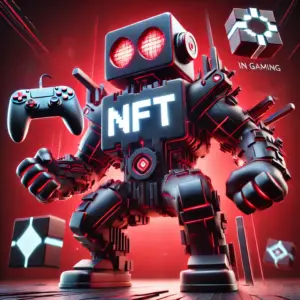The world of Non-Fungible Tokens (NFTs) has exploded in recent years, becoming one of the most exciting and rapidly evolving sectors of the cryptocurrency industry. While NFTs have primarily been used to represent digital artwork, collectibles, and other unique items, a new concept called “NFT staking” is emerging as a potential game-changer.
What is NFT Staking?
NFT staking is similar to cryptocurrency staking, which allows token holders to earn rewards by locking up their assets and contributing to the security and operation of a blockchain network. In the case of NFT staking, instead of staking cryptocurrencies, NFT holders stake their unique digital assets to earn rewards.
How Does NFT Staking Work?
The process of NFT staking typically involves locking up your NFTs in a staking pool or smart contract for a predetermined period. During this time, your NFTs are unavailable for sale or transfer, but you earn rewards in the form of cryptocurrency or other benefits, such as exclusive access to features or early access to new products or services.
Why Stake NFTs?
There are several reasons why NFT holders might choose to stake their assets:
- Earn Passive Income: Staking NFTs can provide a steady stream of passive income for NFT holders, without having to sell or trade their assets. This can be a great way to generate additional returns on your investment.
- Support the Project: By staking NFTs, you are contributing to the security and operation of the project or ecosystem you are invested in. This can help to ensure the long-term success of the project and potentially increase the value of your NFTs.
- Access Exclusive Benefits: Many NFT projects offer exclusive benefits to stakers, such as early access to new products or services, discounts on merchandise, or invitations to private events.
Types of NFT Staking Rewards
The specific types of rewards offered by NFT staking projects vary, but some common examples include:
- Cryptocurrency Rewards: Staking rewards are often paid out in the native cryptocurrency of the blockchain network to which the NFT is linked. For example, if you are staking an NFT on the Ethereum blockchain, you may receive rewards in ETH.
- Governance Tokens: Some NFT projects offer governance tokens to stakers, which give them voting power on important decisions related to the project. This can be a valuable way to have a say in the future of the project and potentially influence its direction.
- Exclusive Access: Many NFT projects offer exclusive perks and benefits to stakers, such as early access to new products or services, discounts on merchandise, or invitations to private events.
Examples of NFT Staking Projects
Several NFT projects have already implemented staking mechanisms, and many more are expected to follow suit in the future. Some notable examples include:
- Bored Ape Yacht Club (BAYC): BAYC is one of the most popular NFT projects in the world, and it offers a staking mechanism called ApeCoin Staking. ApeCoin stakers earn rewards in the form of the ApeCoin cryptocurrency, which can be used to vote on governance proposals and purchase exclusive merchandise.
- Decentraland: Decentraland is a virtual reality platform where users can buy and sell land and other digital assets. Decentraland offers a staking mechanism called LAND Staking, which allows users to earn rewards in the form of LAND tokens. LAND tokens can be used to purchase additional LAND, access exclusive features, and participate in governance decisions.
- Animoca Brands: Animoca Brands is a leading blockchain gaming company that has developed a number of popular NFT games. Animoca Brands offers a variety of staking mechanisms for its NFTs, including staking to earn in-game currency, access exclusive content, or participate in governance votes.
Challenges and Considerations
While NFT staking is a promising new development, there are also some challenges and considerations to keep in mind:
- Risk of Volatility: The value of NFTs can be volatile, and this can impact the value of staking rewards. If the value of your NFT drops, the rewards you earn may not be as valuable.
- Risk of Rug Pulls: There have been a number of scams involving NFT staking, so it is important to do your research and only stake with reputable projects.
- Lack of Standardization: There is currently no standard for NFT staking, so the process and rewards vary from project to project. This can make it difficult to compare different staking opportunities.
Conclusion
NFT staking presents a promising avenue for NFT holders to generate passive income, enhance asset value, and participate in the growth of NFT ecosystems. As the concept matures and adoption expands, it is likely to play an increasingly important role in the future of NFTs.






